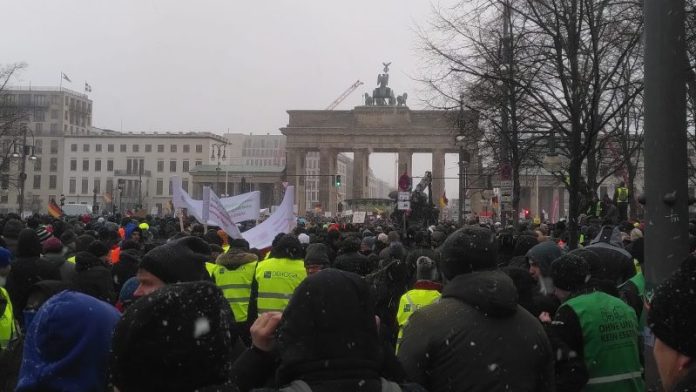This week began and ended with the long road in front of Berlin’s iconic Brandenburg Gate jammed with heavy vehicles honking in protest.
Such demonstrations underline the deep disillusionment in Germany with the government of Chancellor Olaf Scholz, while he continues to say the same thing or simply remain silent: “Everyone is called on now to take a clear stand for solidarity, for tolerance, for our democratic Germany.”
Despite this, he came to power with a progressive, modernising agenda, flirting with the people through multiple crises and reconciling lofty goals such as transforming Europe’s largest economy to meet climate goals and invest in neglected infrastructure, while at the same time complying with Germany’s strict debt-ceiling rules.
Though, it is now realised and seen by many as dysfunctional and incapable.
Because the government points to successes, including averting an energy crisis after Russia cut off gas supplies to Germany. But too often the combination of two centre-left parties with a pro-business rival has irritated Germans. Then there’s the new spending – particularly the plan to replace fossil-fuelled heating systems with greener alternatives. Added to this is frustration with inflation over the past two years.
Scholz sees that fears are not limited to cutting diesel tax breaks for farmers.
“I think crises and conflicts are creating overall uncertainty,” he said in a video message last weekend. “Many worry: what will happen next? What will the future bring for me? All this is leading to some expressing this loudly.”
The chancellor himself has been criticised for managing the unwieldy three-party alliance and poor communication, although his government is currently under no threat.
However, Germany’s next parliamentary elections are in autumn 2025 and it is unclear how it can reverse its falling ratings, with polls showing low levels of trust in Scholz and his government and widespread sympathy for farmers’ protests against cuts to diesel tax breaks.
The government eventually softened its stance by stating that the car tax exemption would be retained and the reduction in tax credits would be phased in over three years, but predictably this did not satisfy Germany’s well-organised farmers, who held a week of protests culminating on Monday in Berlin.
Our farmers are disappointed, they are disappointed that they haven’t been listened to, and they can’t understand why they should be further burdened in European competition, Joachim Rukwied, the head of the German Farmers’ Association, said Friday.
On the other side, no less dangerous for the government, organisers of Friday’s truck drivers’ demonstration called for the cancellation of highway toll increases for trucks and protested against carbon tariffs.
Germany’s tax on carbon dioxide emissions from fuels has been increased more than previously planned, another result of the budget crisis.
In addition, a court ruling in November shattered one of the government’s main funding pillars and forced it to rush to fill a big hole in this year’s budget. The government tried to circumvent Germany’s debt rules by diverting 60 billion originally earmarked for COVID-19 pandemic mitigation to climate change measures and modernising the country.
Alternative for Germany party is currently second in national polls, behind the main centre-right opposition bloc but ahead of the parties in Scholz’s coalition. European Parliament elections are scheduled for June and elections in the three Lands for September.
